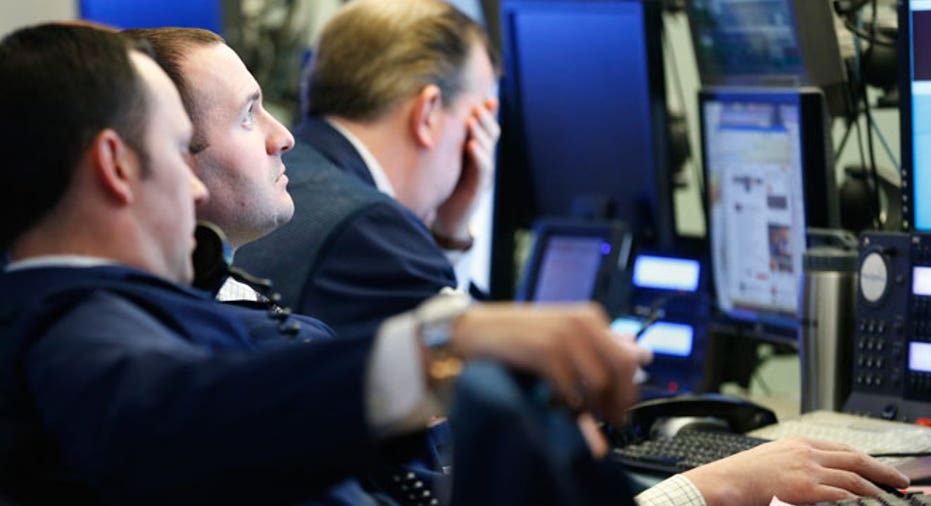Wall Street Retreats as Jobs Data Disappoint

FOX Business: Capitalism Lives Here
Traders darted out of equities in search of safer assets Friday after a much weaker-than-expected report on the U.S. labor market fueled concerns about the soundness of the world's biggest economy. However, the sharp selloff that had the Dow down by more than 170 points early in the session was largely erased by the close.
Today's Markets
The Dow Jones Industrial Average dropped 40.86 points, or 0.3%, to 14565.25, the S&P 500 dipped 6.70 points, or 0.4%, to 1553.28 and the Nasdaq Composite slid 21.12 points, or 0.7%, to 3203.86.
The Labor Department said nonfarm payrolls ticked up by 88,000 in March from February, widely missing expectations of an increase of 200,000. The unemployment rate dropped to the lowest level since December 2008 to 7.6% from 7.7%.February’s nonfarm payroll increase was revised up to 268,000 from a previously reported 236,000.
Digging into the report, the private sector tacked on 95,000 jobs, while the government shed 7,000. The labor force participation rate, which tracks the proportion of the population that is currently employed or seeking employment, tumbled to 63.3% -- the lowest level since 1979.
"The sting from today's jobs report is confirmation that our fears surrounding sequestration, the fiscal cliff, and recent weak macro headlines are actually coming true," Todd Schoenberger, managing partner at LandColt Capital wrote in an email to FOX Business.
Traders immediately shifted into safe-haven assets on the heels of the report. Indeed, the 10-year Treasury yield slid 0.06 percentage point to 1.705% -- the lowest level since December. In equities, the losses on the day were concentrated in economically-sensitive sectors, such as technology and financials. Meanwhile, traditional safety plays, like utilities and telecommunications, generally performed well.
The labor market has been showing signs of improvement in recent months, but government and private economists have said the rate remains considerably lower than where it should be to support robust economic growth. Indeed, the Federal Reserve has been pushing hard to accelerate job growth -- keeping interest rates at record lows and buying vast amounts of bonds.
"The Fed will be troubled by the lack of job creation, and this report reinforces our view that QE3 will remain in full force at least for the rest of 2013," Nigel Gault, chief U.S. economist at IHS Global Insight, wrote in a note to clients Friday.
Still, not all economic data released on the day were negative. The Commerce Department said the U.S. trade deficit narrowed to $43.0 billion in February, from an unrevised $44.5 billion in January as crude oil imports fell to their lowest level since March 1996. Analysts expected the trade gap to widen slightly to $44.6 billion. The gap figures directly into first-quarter gross domestic product readings, with a smaller deficit taking less away from GDP.
Meanwhile, the situation in North Korea remained perilous.
"North Korea has overtaken Iran as the year's biggest potential flashpoint," Tina Fordham, an analyst at Citigroup wrote in a report to clients. "The current imbroglio highlights the current state-of-play in Asian geopolitics."
The country has repeatedly threatened to attack the U.S. and its neighbor, South Korea. The Korean Armistice agreement was signed in 1953, which halted the Korean War via a ceasefire, but according to Citi's calculations, there have been 200 incidents since then that have resulted in casualties.
Brenda Kelly, a market analyst at IG in London, said in an interview with FOX Business that while the situation there isn't in the forefront of traders' minds, it's "hanging over our heads."
In commodities, oil and gasoline prices were to the downside, while gold advanced.
Foreign Markets
The Euro Stoxx 50 sold off by 1.4% to 2584, the English FTSE 100 slid 1.5% to 6250 and the German DAX plummeted 2% to 7659.
In Asia, the Japanese Nikkei 225 soared 1.6% to 12834 and the Chinese Hang Seng sold off by 2.7% to 21726.



















